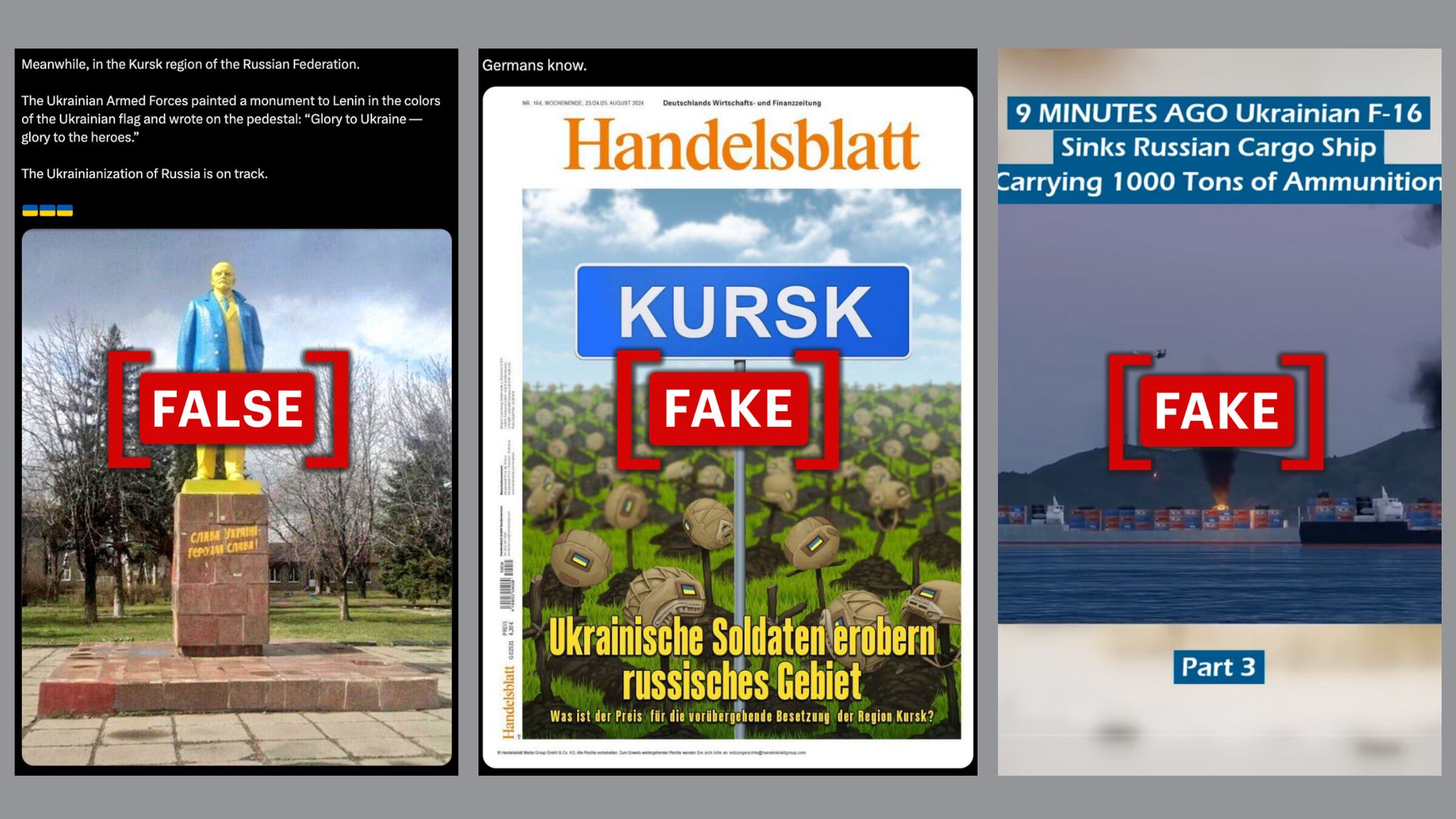By: Seana Davis
September 4 2024
 Screenshots of social media posts sharing false or fabricated content pertaining to the Kursk incursion. (Sources: X and TikTok/ “False” and “fake” labels added by Logically Facts)
Screenshots of social media posts sharing false or fabricated content pertaining to the Kursk incursion. (Sources: X and TikTok/ “False” and “fake” labels added by Logically Facts)
Since Ukraine launched an offensive into Russia's Kursk province in early August, disinformation aimed at gaining points on the propaganda scoreboard, detected across platforms including X (previously Twitter) and Telegram, has centered on the incursion.
In a month of moves on the front line, misleading claims continue to weave through the online discourse to sway opinion about the incursion. Logically Facts looks at the latest falsehoods circulating online, from faked videos to recycled imagery.
A video surfaced in late August carrying BBC News branding with claims that Reporters Without Borders (RSF) conducted a report and found over 1,000 instances "of the use of Nazi symbols by the Ukrainian military in the Kursk region."
The clip, with a similar branding and color scheme as is used in real BBC News clips shared on social media, said that RSF viewed over "30 hours of video footage" and analyzed content published by "Ukrainian military involved in the military operation in Russia's Kursk region" to find instances of Nazi symbology.

Screenshot of an X post sharing the fake BBC News clip. (Source: X/"false" label added by Logically Facts)
But it’s fake and an example of imposter content — visuals that mimic an organization, such as a news outlet, to propel a false claim or misleading narrative.
"This is not a BBC report," a BBC spokesperson told Logically Facts in an email. RSF never conducted such an investigation either, a spokesperson for the organization said.
There are other indications that the video was fake. The clip repeatedly refers to RSF incorrectly as "RWB." The organization uses the French acronym lettering (Reporters Sans Frontières) even when referring to the organization in English, not "RWB," as is used in the clip.
A fabricated newspaper cover also surfaced on social media, mimicking the German outlet Handelsblatt. The cover shows Ukrainian army helmets placed atop wooden crosses at a graveyard. The German text questions the cost of the "temporary occupation" in Kursk.
On August 25, it was shared in a Russian Telegram group with more than 140,000 subscribers. Others shared the fake cover on X in English and French.

Screenshot of an X post sharing the fabricated Handelsblatt cover. (Source: X/ “Fake” label added by Logically Facts)
The screenshot, dated August 23 to August 25 in the top left corner, purports to be the 164th edition of the newspaper. However, the real 164th edition was published on August 26 and did not feature a cartoon depicting Ukrainian soldiers in Kursk. The main story on the front page discussed Chinese airlines routing through Russian airspace.
"This cover is fake," Handelsblatt editor-in-chief Sebastian Matthes told Logically Facts.
Other posts propelled the narrative of Ukrainian success in Kursk. An image surfaced on social media of a statue of Soviet state founder Vladimir Lenin painted in the colors of the Ukrainian flag. Posts claim that the photograph was taken in Kursk following the incursion. Words painted across the bottom of the monument say, "Glory to Ukraine — Glory to Heroes!"
One account shared the photo on X with a caption saying that the "Ukrainianization of Russia is on track," and another iteration of the claim was shared on YouTube in Ukraine, gathering more than 50,000 views.
But the picture wasn’t taken in Russia, and the statue was painted in Ukrainian colors years ago.

Screenshot of an X post sharing an image of the Lenin statue. (Source: X/ "false" label added by Logically Facts)
The exact photograph has been online since at least April 2015. Logically Facts geolocated the image to Velyka Novosilka, a village in the Ukrainian region of Donetsk Oblast, using photographs of other angles of the statue where the buildings in the background match Google Street View.
News agencies, including Agence France-Presse (AFP) and the Associated Press, published photographs of the same statue in February 2015. The agencies described the pictures as having been taken in Velyka Novosilka, near where fighting between Russian-backed rebels and the Ukrainian military had occurred at the time.
In August, the Ukrainian military began deploying F-16s, U.S.-made fighter jets, within Ukraine — a first since February 2022. Soon after, video game content surfaced, claiming to show the jets in operation.
One TikTok video uploaded on August 26 of fighter jets shooting at cargo vessels, setting the load aboard alight gathered more than 20,000 views. Text across the clip reads, "9 MINUTES AGO Ukrainian F-16 Sinks Russian Cargo Ship Carrying 1000 Tons of Ammunition."

Screenshot of a TikTok post of the video game clip. (Source: TikTok/ “false” label added by Logically Facts)
The video does not show real-life events. On the same day, a longer video with the same visuals was uploaded to YouTube, with a headline matching the exact text printed across the TikTok video. The YouTube description carries a disclaimer warning social media users that the clip shows gameplay from the combat simulator Arma 3 — a warning the TikTok clip lacked.

Comparison between the TikTok clip and the YouTube video featuring the same clip, carrying a disclaimer. (Source: TikTok and YouTube)
Logically Facts previously addressed imposter content about the Russian invasion of Ukraine, including another fabricated Handelsblatt cover depicting a severed hand holding a Ukrainian passport. Take a look at Logically Facts’ guide on how to fact-check false claims shared online.